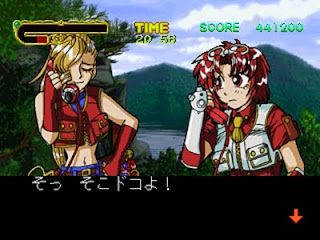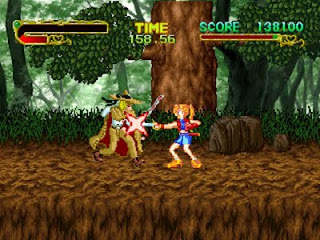 |
| Insert own subtitles here |
Rapid Angel is an interesting blend of genres, where platformer meets beat-‘em-up. As you saunter through each of the areas, you’ll encounter a variety of foes with equally diverse weaponry. Your character has numerous moves to work with: standard attack, special attack, block, double jump, dash, and dash attack. The screen only halts when combating a mini-boss, as opposed to stopping every time a group of baddies appear in similar games, which equals a lot more freedom. Freedom is a necessity since the platforming sections tend to span several screens or, in some cases, dominate the level.
 |
| What the hey is that?! |
 |
| Running into my sword… how dumb is that? |







